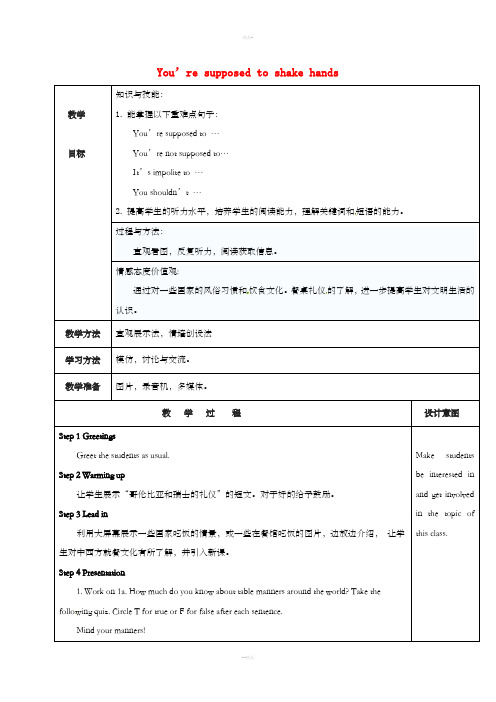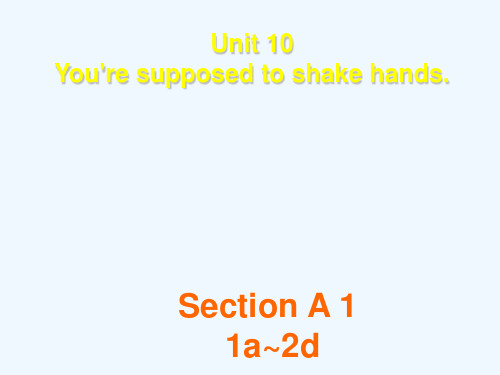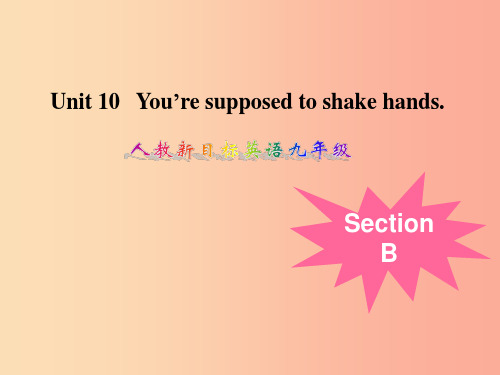九年级英语全册 Unit 10 You’re supposed to shake hands(第4课时)习题 (新版)人教新目标版
九年级英语全册 Unit 10 You’re supposed to shake hands Sec

You’re supposed to shake hands教学目标知识与技能:1.能掌握以下重难点句子:You’re supposed to …You’re not supposed to…It’s impolite to …You shouldn’t …2.提高学生的听力水平,培养学生的阅读能力,理解关键词和短语的能力。
过程与方法:直观看图,反复听力,阅读获取信息。
情感态度价值观:通过对一些国家的风俗习惯和饮食文化。
餐桌礼仪的了解,进一步提高学生对文明生活的认识。
教学方法直观展示法,情境创设法学习方法模仿,讨论与交流。
教学准备图片,录音机,多媒体。
教学过程设计意图Step 1 GreetingsGreet the students as usual.Step 2 Warming up让学生展示“哥伦比亚和瑞士的礼仪”的短文。
对于好的给予鼓励。
Step 3 Lead in利用大屏幕展示一些国家吃饭的情景,或一些在餐馆吃饭的图片,边放边介绍,让学生对中西方就餐文化有所了解,并引入新课。
Step 4 Presentation1. Work on 1a. How much do you know about table manners around the world? Take the following quiz. Circle T for true or F for false after each sentence.Mind your manners!Make students be interested in and get involved in the topic of this class.1. In India, you’re supposed to eat with your hands. T F2. In China, you’re not supposed to stick your chopsticks into the food. T F3. In Korea, the youngest person is expected to start eating first. T F4. In France, you’re supposed to put your bread on the table. T F5. In China, it’s impolite to use your chopsticks to hit an empty bowl. T F1)先让学生自己做,老师指导,让他们理解每个句子的意思。
【配套K12】[学习]九年级英语全册 Unit 10 You’re supposed to shak
![【配套K12】[学习]九年级英语全册 Unit 10 You’re supposed to shak](https://img.taocdn.com/s3/m/847af22e16fc700abb68fc68.png)
Unit 10: You’re supposed to shake hands.Period 4: Reading, Listening and Speaking(In the United States, you’re not supposed to do that.)Objectives●To learn to understand and use supposed to + infinitive●To read, listen and speak how you are supposed to behave at dinner tables■Warming up by reading to the recordingHello, it’s nice to meet you on this cool lovely morning! To begin with, listen and read loud to the recording of the text on page 96. But try not to look at the text while listening and reading it aloud.1 Reading and circlingOn page 97 is a chart with 5 sentences. Read them and circle T for true and F for false.2a Listening and numberingListen to a conversation between Steve and Satoshi about table manners in Japan. Here is the key:Now go to page135 to read this conversation. While reading try to find all the sentences about table manners. And also cut/ the sentence into thought groups, study all the predicates, circle all the linking words and underline all the expressions. That’s grammar study, indeed.Now read the conversation again to turn it into an article.2b Listening and matchingYou are supposed to listen and match the sentence parts in the chart on page 97.2c Pairing and speakingIn pairs you are supposed to talk about the table manners in your country.。
英语人教版九年级全册Unit 10 You are supposed to..

Look at the map of the world. Please list the countries as many as possible and tell the others what people do when they meet for the first time in different countries. Work in pairs and discuss the question.
动词不定式
eg. You are supposed to arrive on time.
MLiasttecnh athnedccohuencktriyeosuwriathnstwherc风uin俗st1习oam惯. s. 1ba
__c__ Brazil
__b__ the United States __a__ Japan __b__ Mexico __a__ Korea
A: In …what are the people supposed to do when they meet for the first time? B: They’re supposed to …
China
the United states
Mexico
Brazil
Korea
Japan
A: What are people in Korea supposed to do when they meet for the first time?
B: They’re supposed to bow. How about in the United States?
A: In the United States, they’re expected to shake hands. … be expected to do… 被期望会做…; 有望做…
九年级英语全册 Unit 10 You’re supposed to shake hands Sec

c. start eating first if there are older people at the table.
1d Talk about other table manners in your country.
A: We’re supposed to... B: Yes, and it’s impolite to ...
China
You are not supposed to stick your chopsticks into the food.
Korea The youngest person is not supposed to start eating first.
France You’re supposed to put your bread on the table.
in Japan rude
eat or drink while walking down the street
Presentation
Table manners around the world. There are many table manners around the world. But different countries have different culture. …
4. In France, you’re supposed to put your bread on the table.
TF
5. In China, it’s impolite to use your chopsticks T F to hit an empty bowl.
1b Steve is going to China to study. His friend
- 1、下载文档前请自行甄别文档内容的完整性,平台不提供额外的编辑、内容补充、找答案等附加服务。
- 2、"仅部分预览"的文档,不可在线预览部分如存在完整性等问题,可反馈申请退款(可完整预览的文档不适用该条件!)。
- 3、如文档侵犯您的权益,请联系客服反馈,我们会尽快为您处理(人工客服工作时间:9:00-18:30)。
Unit 10 You're supposed to shake hands 第四课时Section B(1a~1e)
01 基础过关
Ⅰ.根据句意及汉语提示填写单词。
1.Please fill this empty(空的) glass with water. 2.You must be very excited(兴奋的) to have a chance to visit the beautiful city.
3.Remember not to stick(插) your chopsticks into the food.
4.Look! The boy is pointing(指) a stranger with one of his fingers.
5.I feel a little nervous(紧张的) because I will have a job interview tomorrow.
Ⅱ.用括号内所给单词的适当形式填空。
6.It's polite to__eat(eat) your food silently. 7.My teacher asked us not__to__be(not be) late for school.
8.I think the movie is worth seeing(see).9.You shouldn't use your chopsticks to__hit(hit)your bowl in China.
10.You're not supposed to__speak(speak) loudly at the table in the USA.
Ⅲ.按要求完成下列句子,每空一词。
11.It's important for us to spend time with family and friends.(改为同义句)
To spend time with family and friends is important for us.
12.Would you drop in at my house when you are in town?(改为同义句)
Would you come over to my house when you are in town? 13.You are supposed to be there at__6:00.(对画线部分提问)
What time am I supposed to be there? 14.Parents should let their children know some good manners.(改为同义句)
Parents are supposed to let their children know some good manners.
15.What are you supposed to do? Do you know?(合并为一句话)
Do you know what you are supposed to do?
02 能力提升
Ⅳ.阅读理解。
What shaking the head means is not always the same in different countries. Maybe some visitors would be surprised when they first came to India. When they talk to an Indian,they would find he would often shake his head. The visitors might think that the Indian doesn't like what they say. But in fact,they would be completely wrong.
Indians always shake their heads when they talk to others. It does not mean “No”.If someone wants to visit India,he should know this,or it will be in trouble. Here is a story.
One day,a foreign officer went to India on business. He hired a car from a company at $1,000 a month and asked an Indian to drive the car for him. When he told his driver to take him to his hotel,the Indian shook his head right away. The office said again and the driver shook his head again. The officer,of course,got angry.
“How dare you refuse my order?” he shouted.“Drive me to my hotel righ t away!” The driver answered in a very loud voice,too,“Yes,sir!” But to the officer's surprise,the driver shook his head at the same time.
The car started,and the foreign officer was now too surprised to say a word. He thought about it for a while,and then he nodded with a smile,“No means Yes here!”
(B)16.What do Indians always do when they talk to others?
A.They say “Yes”.
B.They shake their heads.
C.They smile.
D.They shake their hands.
(A)17.What did the foreign officer go to India for? A.On business. B.To go shopping.
C.For a trip. D.To visit a friend. (C)18.The underlined word “hired” means “________” in Chinese.
A.偷 B.买 C.租 D.借
(D)19.What can we learn from the passage?
A.The officer worked in a company in India. B.The Indian didn't want to drive the officer to the hotel.
C.The officer got mad when the Indian shook his head for the third time.
D.The officer understood the driver in the end.
(D)20.What's the best title for this passage? A.A Bad Driver
B.A Foreigner in India
C.Why Indians Like Shaking Heads
D.Shaking the Head Means “Yes” in India。
